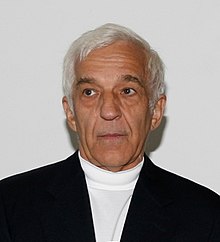 Concert Review: Dresden Staatskapelle-Thielemann
Concert Review: Dresden Staatskapelle-Thielemann
Feb 27, CCCH
Dresden Staatskapelle-Thielemann
Strauss-Bruckner
I don't usually attend the HK Arts Festival concerts: there are too many people there who go for the wrong reasons; these people never attend non-glamorous events, like HKPO concerts; these people are there to be seen, not there for the music. I am sure our besieged chief executive Leung knows nothing about Bruckner (he disappeared after the first half)! The events also attract name-brand lovers, who otherwise do not care about the music scene.
I made an exception this year, not for the big names of Dresden/Thielemann, but for the Bruckner Ninth, a sacred piece of music to me.
Almost two years ago, in NYC I heard the same team in an outstanding Bruckner's Eighth (reported briefly
here), but this outing proved just a little less satisfactory. In a way it went the same way as Yannick Nezet-Sequin's performance with the Philadelphia I heard in NYC a year later (reported
here), tightly argued in the first two movements but lacking in coherence and spiritual journey in the penultimate third movement, surely one of the most mysterious in the classical cannon.
As mentioned in a NYT link I provided previously, the orchestra's greatest strength is its totality. The brass and woodwinds don't really stand out, but they play all of one piece. The ensemble-ship is enticing. The strings are magnificent, playing with chamber-like co-ordination and precision in Strauss' Metamorphosen. In Bruckner's Ninth, the brass dominate. In the first movement, Thielemann holds them in reserve at first, but lets them loose a bit later to good effect. His dynamic gradations are unusually smooth and powerful, sometimes a little reminisecent of Celibidache and others, sometimes just a little too consciously grand. The scherzo is well characterized. But imho the third movement falls apart a bit. There is a glacial feeling, of orchestral energy winding down. The piercing dissonance and struggle that should be there are not well conveyed. The dissolution should be in the music, not in the orchestra. In a word, for this listener, a bit of spirituality is lacking. As is appropriate for this program, no encore was offered.
A sour note. After the Strauss, some idiot (an elderly person) clapped way before the ending, but what followed after the applause was far worse, indeed pandemonium. I was sitting right beneath the organ, and all of a sudden this tall, gaunt elderly person behind me started a cacophonous diatribe against the offender (in both Cantonese and English), demanding his removal for insulting the music. Right away he was echoed by another person further up front. It was the most confrontational I have even witnessed in a concert hall, anywhere. But that is only half the story.
During the intermission, this self-righteous person behind me, and his younger female companion, circled the hall hunting for the offender. He finally got him cornered and in ferociously demanded the ushers remove him (they did not). He was still piping angry when the second half was about to commence. I heard them converse in Japanese and turned to say to them: "the other person is an idiot, but your anger is preventing you and us from enjoying the concert ..." Then he went on swearing, and I heard "fucking chink"! Imagine! Ten years ago, I'd have gotten into a fight with him, but with due respect to the performance soon to begin, I did not. I just said to them, "look, this "fucking chink" thing doesn't belong here!. Just enjoy the music!". The companion was obviously embarrassed and asked him to tone down the "nationalist" (her word) stuff.
Imagine, to ensure a good spiritual journey with Bruckner, one is willing to curse, persecute and blow hot and cold. Bruckner would not understand, but Hitler and the many Bruckner lovers in the Third Reich, would. This Japanese I encountered is the lowest of the low. That this person is obviously a educated long-time HK resident makes it more sad.
 pics from NYT.
pics from NYT. May 14, 2015, Carnegie Hall
May 14, 2015, Carnegie Hall

![WAGNER, R.: Rheingold (Das) [Opera] (Goerne, DeYoung, Begley, Sidhom, Cangelosi, Hong Kong Philharmonic, van Zweden)](http://www.naxos.com/SharedFiles/images/cds/others/8.660374-75.gif)










